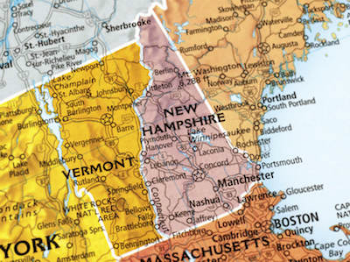
Overview of New Hampshire Retirement Tax Friendliness
As of Jan. 1, 2025, New Hampshire no longer taxes any form of income. Property taxes in New Hampshire are among the highest in the country, but there is no state sales tax.
To find a financial advisor who serves your area, try our free online matching tool.
| Annual Social Security Income Dismiss | Annual Retirement Account Income Dismiss | Annual Wages Dismiss |
| Location Dismiss | Year of Birth Dismiss | Filing Status |
| Add Pension | |
| Annual Income from Private Pension Dismiss | Annual Income from Public Pension Dismiss |
| Your Tax Breakdown Federal State Local Total Taxes |
| is toward retirees. |
| Social Security income is taxed. |
| Withdrawals from retirement accounts are taxed. |
| Wages are taxed at normal rates, and your marginal state tax rate is %. |
New Hampshire Retirement Taxes

The Granite State is a popular choice for seniors who are looking to relocate for their retirement. It is filled with charming New England towns, while maintaining a lower cost of living than most other New England states. New Hampshire also has some of the lowest retirement taxes of any state in the country.
Why? Well it begins with New Hampshire’s personal income tax, or rather, lack thereof. New Hampshire has no tax on personal income. This means that retirement income, whether from Social Security, a pension or a retirement account, is not taxed at the state level. That can create significant savings for retirees as compared with other states.
Another major source of savings for seniors in New Hampshire is the state's nonexistent sales tax.
A financial advisor can help you plan for retirement and other financial goals. Finding a financial advisor doesn't have to be hard. SmartAsset’s free tool matches you with vetted financial advisors who serve your area, and you can have a free introductory call with your advisor matches to decide which one you feel is right for you. If you’re ready to find an advisor who can help you achieve your financial goals, get started now.
Is New Hampshire tax-friendly for retirees?
New Hampshire has no personal income tax, which means Social Security retirement benefits are tax-free at the state level. Income from pensions and retirement accounts also go untaxed in New Hampshire. On top of that, there is no sales tax, estate tax or inheritance tax here.
So what does New Hampshire tax? Real estate. If you are planning on buying a home for your New Hampshire retirement, you will pay some of the highest property taxes in the U.S.
Is Social Security taxable in New Hampshire?
Since New Hampshire does not have a state income tax, it does not tax Social Security retirement benefits. Some benefits may still be subject to federal taxes, however.
Are other forms of retirement income taxable in New Hampshire?
Retirement income is not taxable in New Hampshire. This includes income from a pension and income from retirement accounts such as a 401(k) or IRA. Retirement income from these sources is taxed in many other states, so this can represent a significant source of savings for New Hampshire retirees.
How high are property taxes in New Hampshire?

A typical homeowner in New Hampshire pays more than $6,707 annually in property taxes. That is more than twice the national average. One reason property taxes are so high is that the state of New Hampshire collects a statewide property tax in addition to the local taxes that cities, counties and school districts collect.
In all, the median effective property tax rate in New Hampshire is 1.46%. This means a senior who owns a home can expect to pay about $1,460 in annual property taxes for every $100,000 in home value.
New Hampshire provides a property tax rebate for some homeowners. To be eligible, single persons must have income of no more than $37,000, while for married persons or heads of household, the income limit is $47,000. The rebate is equal to some or all of the state property taxes paid in a year. The exact amount is determined by a complicated formula and depends on home value as well as household income.
How high are sales taxes in New Hampshire?
There are no sales taxes in New Hampshire. Products such as clothing, electronics, food and furniture can all be purchased without sales tax. For retirees, that can add up to significant savings as compared with other states. The national average sales tax rate is around 5%.
What other New Hampshire taxes should I be concerned about?
New Hampshire does not have a sales tax, but it does have a number of sin taxes. The state has a cigarette tax of $1.78 per 20-pack of cigarettes and a beer tax of 30 cents per gallon. Alcohol sales also provide significant revenue to the state, because you can only purchase liquor in New Hampshire at a state-run store. There is no estate tax or inheritance tax in New Hampshire.

